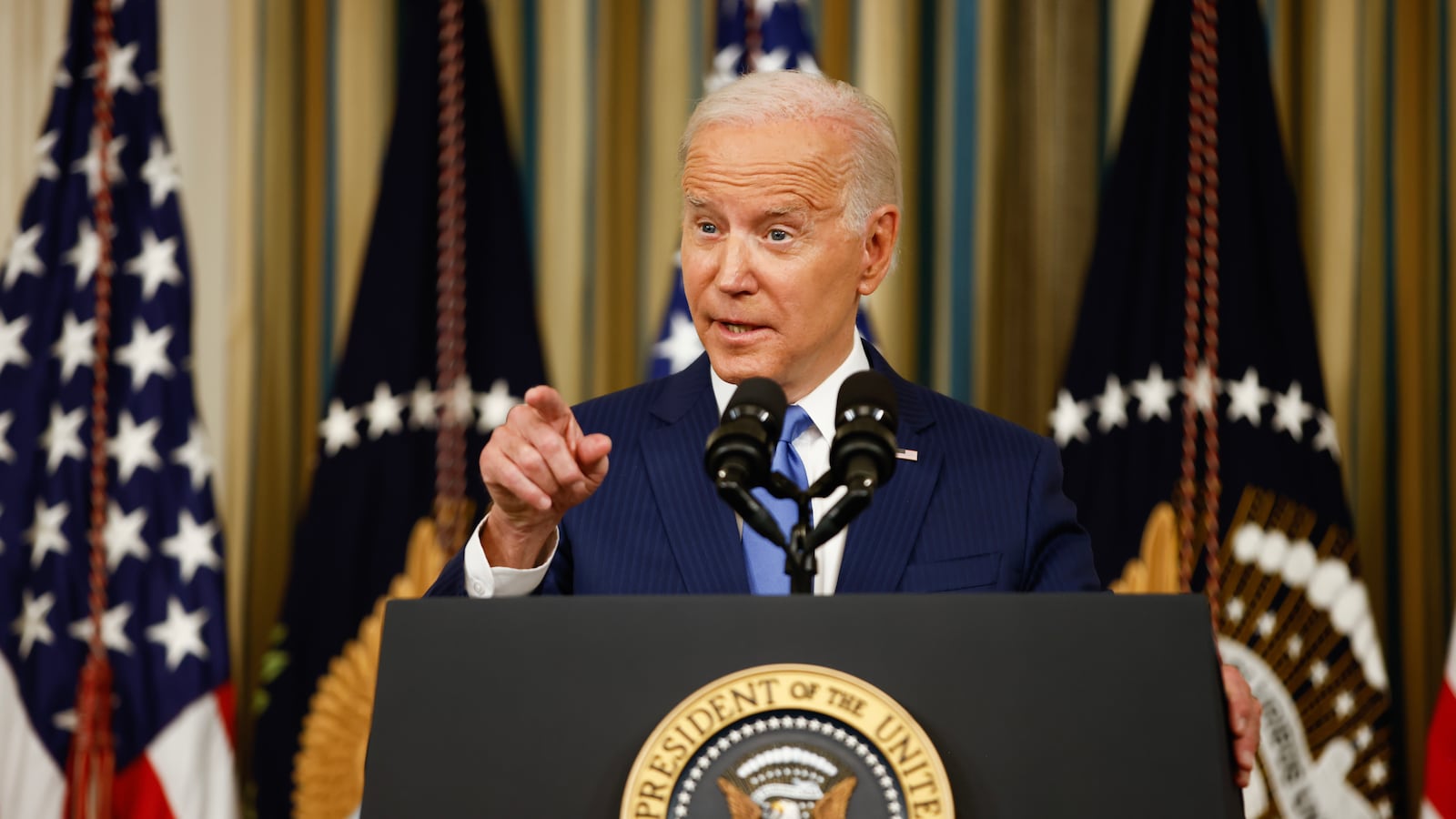Skyrocketing inflation. Underwater approval ratings. Looming recession. A predecessor hellbent on turning Congress into a weapon of obstruction and investigation.
President Joe Biden was bracing for a blistering night of midterm election results on Tuesday, but a better-than-expected showing by Democrats across the country validated the party’s closing message: that Republicans had grown dangerously extreme on voting rights, Medicare funding, and, in particular, abortion.
In states ranging from deep-red Kentucky to middle-ground Michigan, voters delivered major victories for abortion access, a buoy to Democrats who had made the issue a centerpiece of their midterm election strategy after the Supreme Court overturned Roe v. Wade in June. Referenda on enshrining the procedure in state constitutions outperformed Biden’s own 2020 election performance in every state where the issue was on the ballot, according to early returns, and a pair of anti-abortion propositions in Kentucky and Montana—both states that supported former President Donald Trump by wide margins—both appear to have failed.
Numerous vulnerable Democrats, from New York Gov. Kathy Hochul to Gov. Gretchen Whitmer of Michigan, successfully campaigned on the assertion that their re-election was critical to protecting or expanding abortion rights, and even non-federal candidates highlighted Sen. Lindsey Graham’s (R-S.C.) proposed national ban as a reason to back them.
“The ballot measures yesterday in California, Kentucky, Michigan, Montana, and Vermont, coupled with the vote this summer in Kansas, make crystal clear that the country rejects the devastating abortion bans that have caused immense suffering and chaos,” said Kristin Rowe-Finkbeiner, executive director of abortion-rights organizer MomsRising Together. “Moms will look to the new Congress to codify Roe v. Wade, protect our freedom to decide if, when, and how many children to have, and ensure that we can all access the reproductive health care we need.”
But the success of measures protecting abortion access in the wake of Dobbs v. Jackson Women’s Health Organization now presents a potential challenge for Biden going forward. The president, a churchgoing Catholic and onetime abortion opponent whose views on the procedure have evolved more slowly than almost any other leading Democrat, has a long-documented difficulty discussing the issue. It took nearly 500 days in office before Biden even used the word “abortion” publicly, and the White House has repeatedly clashed with abortion-rights advocates who have accused the administration of holding back on efforts to protect the procedure.
That lack of facility with the issue was noticeable in Biden’s press conference with reporters on Wednesday. Despite numerous surveys indicating that the issue was a top priority for Democrats, and the likelihood that abortion-minded voters may have helped save at-risk Democrats like Rep. Elissa Slotkin in Michigan, Biden mentioned abortion only a single time, in a promise to veto any Republican attempts at a national ban.
Privately, administration officials have told reporters that the slow-walk on measures to shield abortion access from the Supreme Court’s ruling—an effort, they have said, to keep the issue in the news long enough to boost Democrats in the midterms, in addition to keeping post-Dobbs executive actions on the most solid legal footing.
Biden signed a set of executive actions intended to protect patients seeking out-of-state abortion care in July, followed a month later by additional actions with the same stated purpose. In October, Biden announced new federal funding for birth control and reproductive healthcare—although not abortion services—actions that he said at the time were intended to tell those who need access to reproductive care that “we have your back.”
But other proposals from abortion-rights advocates, ranging from setting up abortion clinics on federal land to declaring a national healthcare emergency in the wake of Dobbs have been dismissed as impractical or legally dubious.
The deliberative abortion strategy appeared to be largely vindicated by Tuesday’s results, assuaging fears that the issue, named one of the most important concerns by Democrats for months following the ruling, had peaked too soon before the midterms were unfounded.
Biden himself has largely emphasized that the only way to truly protect abortion access nationwide is for Congress to pass a law doing so.
“The only way we can secure a woman’s right to choose and the balance that existed is for Congress to restore the protections of Roe v. Wade as federal law,” Biden said hours after the Dobbs decision was released, noting that as president, he was powerless to do so himself. “Voters need to make their voices heard. This fall, we must elect more senators and representatives who will codify a woman’s right to choose into federal law once again.”
Despite that call, Democratic control of the Senate is still uncertain, and with the Senate filibuster in place, even a sweep of the remaining uncalled races couldn’t break a filibuster.
That raises the question: what else is there for Biden to do on abortion, now that voters have confirmed that the issue is enough to stave off serious Republican challenges?
Before Dobbs, when abortion rights were more or less secure nationwide, the issue was largely used as a base motivator by Republicans. In recent years, Alabama, Louisiana, Tennessee, and West Virginia passed constitutional amendments explicitly stating that abortion was not a fundamental right in the state, and legally dubious incremental bans in states like Mississippi and Texas were largely passed as litmus tests for conservative officials.
Internally, some White House aides said that the post-election analysis of a winning strategy may take a temporary backseat to the sighs of relief that a Republican “red wave” didn’t drown the president’s entire agenda—or as one senior White House official told reporters frankly, “didn’t get his ass beaten.”
As another White House source put it: “Thank god right? Like wtf happened?”







